
As Menstrual Hygiene Day highlights, there is a need now more than ever for initiatives that result in more sanitary pads donated to schools.
Having periods is problematic for many girls, as they struggle to attend school either due to poverty or being raised by relatives who do not provide them with adequate hygiene products.
It is estimated that 3 out of 10 girls in South Africa miss school during their periods each month.
Parent24 interviewed Dr Marlin McKay, a medical healthcare practitioner and owner of Goldman Medicine Centre who has over 28-years-of experience in private family practice.
McKay says that access to sanitary towels is critical, because having a period without sanitary towels at school can impact the girl's longer term social and economic activities.
"Lack of sanitary pads can also force girls to use unhygienic material such as cow dung, leaves, newspaper, and dirty cloth," reveals McKay.
She added that we need to acknowledge that menstruation is a natural and biological function that people did not choose to have happen to their bodies. Thus society must ensure that girls, women, and menstruators can experience their periods with dignity.
McKay says that if we do not ensure that 'period poverty' is ended, we will be perpetuating a culture of silence that forces many to cope in isolation.
Must read: How female prisoners are helping girls to stay in school
We asked South African women what are some of the extreme measures they recall using during their periods at school, and their answers are revealing.
"I had to use a sponge with a velvet cloth on top to make it more comfortable. I do not understand why we had to go through that when condoms were accessible in bathrooms. Later on, I had to ask health professionals to insert me with Implanon because I hated periods," said Norma Sutha.
Another woman, Anell Daries, recalled using a tissue or toilet paper wrapping it around her underwear like a sanitary towel to prevent leakage while at school.
Namhla said that she had to use a cloth sometimes a toilet paper. Another young women, Okuhle remembers using a cloth during this time of the month in her school days.
Empower those who menstruate
McKay says that there is a need to empower and educate menstruators about what exactly menstruation is, and its necessity for women.
Girls need to understand that menstruation is natural and "a fundamental bodily process that impacts half of the population," she says.
Breaking the silence on period
Breaking the silence on menstruation includes the women themselves knowing that there is no reason to feel ashamed or embarrassed about their period, to the point of not being open about the symptoms we go through, even the period products we use, says McKay.
She says that we need to start talking more about periods and and work to break the silence on the topic.
She explains, "You do not have to go into great detail about your period. However, you can be open about how the symptoms impact you and, most importantly, how it can impact your daily activities to your friends, family, partner or co-workers."
Also read: Period pain is impacting women at school, uni and work. Let’s be open about it
Help educate other menstruators
Dr McKay says, "we need to understand the impact that period poverty is having, not only in South Africa but around the world."
In other words, by equipping ourselves with that knowledge, we will be helping other menstruators to ensure that their period is not an obstacle. This includes boys and men, she stresses.
McKay emphasises the importance of bringing boys into the conversations around menstruation.
She believes that when boys understand the sensitivity towards periods, this reduces the perpetual cycle of taboos and stigmas around menstruation.
She adds, "By educating young people about the realities of periods, then we can ensure that young girls in the classroom will not be laughed at, but instead will be supported by their peers."
Read: No need to suffer in silence with period pain
Early puberty
McKay also debunked certain myths around starting periods young being associated with being promiscuous or associated with early menopause.
She says that sometimes some girls start their period very young for no reason. Others have a family history of maturing early. Also, hormonal issues can contribute to an early period, such as abnormalities of the ovaries or thyroid glands.
In extreme instances, problems in the brain such as an injury, a tumour or infection can also cause a girl child to reach early puberty.
McKay made an example with an 8-year-old patient whom she diagnosed with a brain tumour after the child developed breasts prematurely.
Dr McKay concludes by saying that parents should be on high alert should their child under 12-years of age start their period, as starting a period at that age is a risk factor for breast cancer.
Chatback:
Share your stories and questions with us via email at chatback@parent24.com. Anonymous contributions are welcome.
Don't miss a story!
For a weekly wrap of our latest parenting news and advice sign up to our free Friday Parent24 newsletter.




 Publications
Publications
 Partners
Partners











